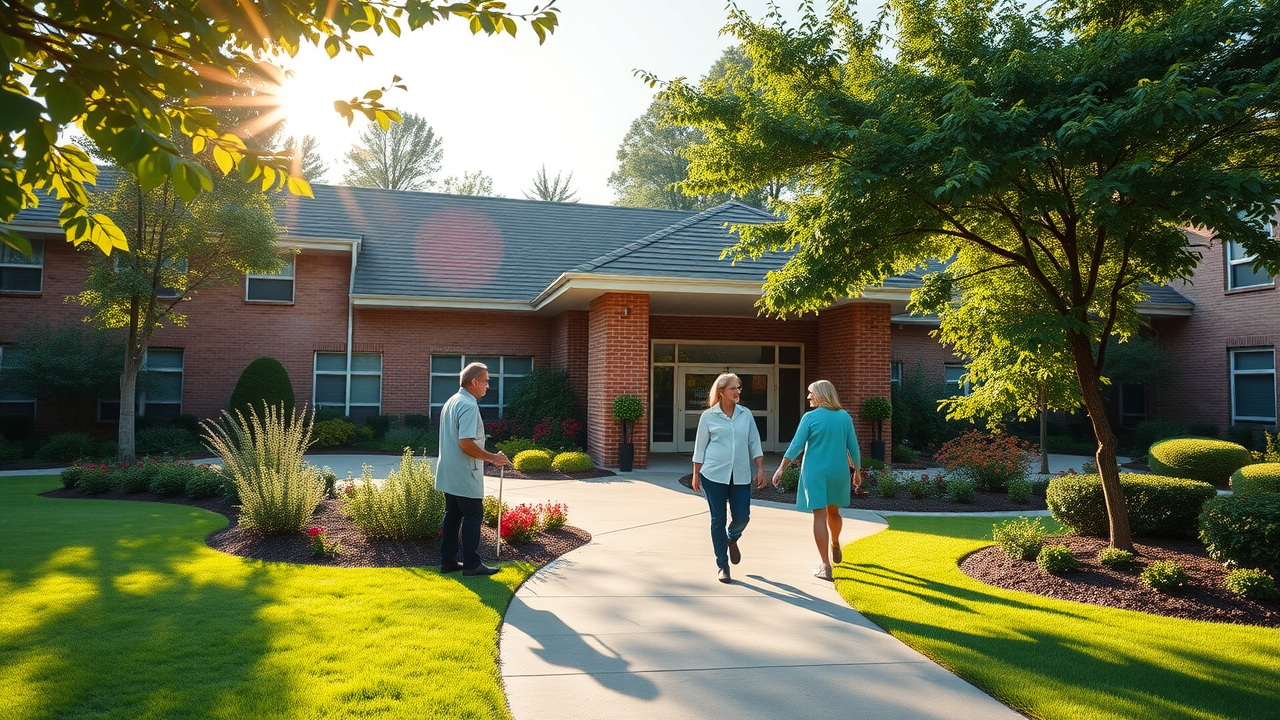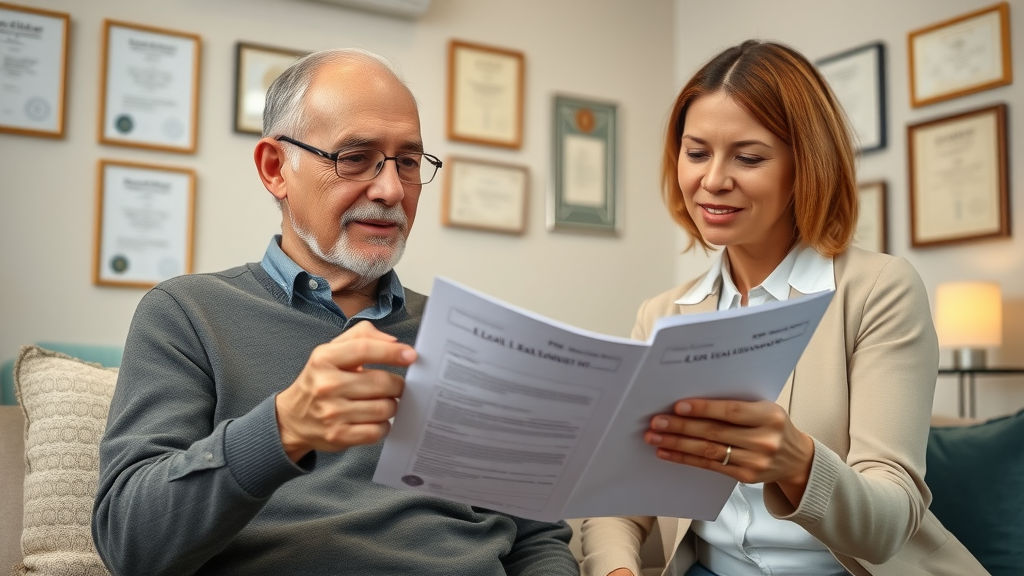-
Every year, over 1.3 million Americans rely on skilled nursing facilities, yet many families are surprised by the wide spectrum in quality and services offered in LA. In this comprehensive guide, discover how to assess skilled nursing facilities LA for yourself or a loved one—empowering your decisions for better care outcomes.

Why Choosing the Right Skilled Nursing Facilities LA Matters: Overview for Families
When faced with the decision to place a loved one in a skilled nursing facility in Los Angeles, families are confronted with more than just logistical arrangements; they're making choices that deeply impact health, dignity, and quality of life. Skilled nursing facilities LA offer varying degrees of nursing care, rehabilitation, and medical oversight. Each facility is unique, with differences in care approach, staff training, and available therapies. Choosing the right nursing facility isn’t just about convenience—it's about safeguarding the long-term well-being of your family member.
Los Angeles is home to a wide variety of skilled nursing facilities, nursing homes, and rehabilitation centers, but not all are created equal. The right fit can dramatically improve recovery or comfort for both short-term and term care needs. Families should understand the distinctions between facility types, the regulatory landscape, and available support services to ensure informed choices. Whether you’re considering a stay after acute care in a hospital or seeking long-term support, knowing what differentiates high-quality skilled nursing can prevent future challenges and promote positive outcomes.
Understanding Skilled Nursing Facilities LA vs. Other Care Options
The term “ skilled nursing facility ” often gets used interchangeably with “nursing home,” but in the context of Los Angeles healthcare, there are important distinctions. Skilled nursing facilities LA are designed for individuals requiring intensive medical care or rehabilitation, often following hospitalization or surgery. These facilities employ registered nurses, licensed practical nurses, and certified staff who provide round-the-clock nursing care, therapies, wound management, and medication administration. In contrast, traditional nursing homes primarily focus on custodial care, offering help with daily living activities such as bathing, meals, and hygiene, but with less medical supervision.
Furthermore, care centers and rehabilitation centers in Los Angeles provide specialized therapies—physical, occupational, and speech—for those transitioning from acute care to a return home environment. Many skilled nursing facilities incorporate or closely partner with rehabilitation centers to ensure seamless discharge planning and comprehensive support for residents. Understanding these differences helps families match the level of care needed for their loved one—be it transitional care, term care, or home care.
Long-Term Impact of Skilled Nursing Facilities in Los Angeles Care Decisions
The choice of a skilled nursing facility in LA has long-lasting effects. Quality care settings can mean faster recovery, reduced risk of re-hospitalization, and a higher likelihood of returning home independently. Conversely, subpar facilities can expose residents to nursing home neglect, chronic health setbacks, and emotional distress. Los Angeles, given its high population density and broad spectrum of healthcare providers, requires careful evaluation of available nursing facilities to ensure your loved one isn’t just safe, but also set up for meaningful health improvements.
Top-rated skilled nursing facilities often display high staff retention, continuous care service improvements, and transparent communication between staff members and families. Families that take time to understand not just the facility’s operational details but also patient satisfaction scores and regulatory standing are best equipped to protect their loved ones and foster improved well-being.
What You'll Gain from This Review: Navigating Skilled Nursing Facilities LA
-
Key differences between skilled nursing facilities, nursing homes, and healthcare centers
-
The most critical evaluation criteria for skilled nursing in Los Angeles
-
Tips for identifying quality and preventing nursing home neglect
-
The financial and legal essentials every family must know

|
|
|
|
Skilled Nursing Facilities LA: Nursing Home vs. Skilled Nursing Facility vs. Rehabilitation Center |
|
Facility Type |
Primary Services |
Typical Length of Stay |
Licensing & Regulation |
|---|---|---|---|
|
Nursing Home |
Custodial care, basic medical support |
Long-term/Indefinite |
State, Federal |
|
Skilled Nursing Facility |
Advanced medical care, rehabilitation, therapies |
Short to mid-term (weeks/months) |
State, Federal |
|
Rehabilitation Center |
Intense physical, occupational therapy |
Short-term |
State, Federal |
Key Differences: Skilled Nursing Facilities LA, Nursing Home, & Care Center
"The gap between skilled nursing facility and a traditional nursing home is defined by the level of medical expertise and the availability of rehabilitation services." — LA Healthcare Expert
Defining Skilled Nursing, Nursing Home, and Care Center in Los Angeles
In Los Angeles, skilled nursing facilities operate differently from traditional nursing homes and care centers. A skilled nursing facility provides comprehensive medical care backed by licensed nurses and physicians, covering post-surgical recovery, acute illness management, and chronic illness stabilization. Every staff member, from director of nursing to on-call therapists, must operate under stringent state and federal regulations. Nursing homes, meanwhile, focus on ongoing, non-medical assistance such as mobility support, meals, and personal hygiene, relying more heavily on aides than nurses.
Meanwhile, a care center often refers to an umbrella term encompassing various care settings, including rehabilitation centers, skilled nursing facilities, and assisted living communities. In LA, these can range from acute care hubs specializing in complex recovery, to long-term care service providers or transitional communities helping patients regain independence. Understanding facility types and their unique offerings ensures a tailored fit, whether the need is short-term rehabilitation or indefinite term care arrangements.

How Skilled Nursing Facilities Support Rehabilitation & Medical Needs
Skilled nursing facilities LA bridge the gap between hospital discharge and full, independent living. They provide robust rehabilitation services, such as physical, occupational, and speech therapies, especially critical for those recovering from surgeries, strokes, or cardiac events. Many LA facilities are physically integrated with or located near top medical centers and rehabilitation centers, enabling swift collaboration between therapists, physicians, and nursing staff.
Beyond therapy, skilled nursing facilities offer 24/7 medical supervision and medication management, complex wound care, pain management, and chronic disease monitoring. With an emphasis on short-term goals, such as preparing patients for a safe return home, as well as long-term support for those needing extended supervision, these facilities play an essential part in the health continuum for Los Angeles residents. Their connection with acute care and healthcare center providers ensures care service plans adapt to each patient’s evolving needs.
The Role of Healthcare Centers in Long-Term Care
Healthcare centers—including skilled nursing facilities LA—provide more than just immediate medical support. For many, they are a source of continuity and stability through transitions in health status, including elderly care, progressive illnesses, or post-acute care. The role of a healthcare center expands to educating families, facilitating discharge planning, supporting chronic disease management, and connecting patients with long-term resources such as social workers or specialized therapists.
Choosing the right healthcare center in Los Angeles can mean better access to top medical professionals, comprehensive care coordination, and a smoother transition to lower levels of care as needed. A facility’s ability to collaborate with local hospitals, home care providers, and out-patient therapists is crucial for creating a customized long-term plan that prioritizes patient confidence and safety.
Step-by-Step Guide: How to Evaluate Skilled Nursing Facilities LA
-
Clarify healthcare and rehabilitation goals
-
Review licensure and LA regulatory compliance
-
Visit potential skilled nursing facilities (tour checklist)
-
Evaluate staff-to-patient ratios and professional credentials
-
Confirm access to rehabilitation center services
-
Assess safety protocols and patient rights
-
Examine discharge planning and term care transition support
Essential Features: From Medical Center Integration to Term Care in Los Angeles
When evaluating skilled nursing facilities LA , prioritize those with direct integration or partnerships with acute medical centers and rehabilitation centers. Proximity to a medical center can expedite specialist consultations, streamline emergency transfers, and enhance collaboration on patient care plans. Review whether the facility’s staff includes board-certified physicians, full-time therapists, and a director of nursing experienced in transitional care and long-term term care management.
Additional essentials include clear and comprehensive care service documentation, ongoing staff training programs, evidence of low staff turnover, and open family communication policies. Facilities that focus on a broad range of therapies and advanced disease management position themselves as leaders, fostering patient improvement and dignified living—attributes especially important in navigating the complex care settings found throughout Los Angeles.
Red Flags: Avoiding Nursing Home Neglect and Poor Skilled Nursing in LA
Even in bustling Southern California, not every skilled nursing facility maintains the same standards of care. Red flags include frequent staffing changes, poor cleanliness, inadequate patient supervision, limited rehabilitation services, and inconsistent record-keeping. Be cautious of facilities with a high rate of reported incidents, unresolved state investigations, or poor ratings from families. A lack of clear safety protocols or reluctance to share staff credentials can also indicate subpar nursing supervision and compromised patient safety.
Nursing home neglect and elder abuse remain real concerns. Families should feel empowered to question facility leadership, examine public inspection reports, and insist on patient-centered policies. Seeking regular updates from staff members and leveraging recommendations from healthcare professionals can help you avoid unqualified or unsuitable centers. In case of suspected neglect or poor care, know your rights—Los Angeles offers various resources for filing formal complaints or reviewing care quality data.

Cost of Skilled Nursing Facilities LA: Budgeting and Insurance Options
Monthly Costs: What to Expect for a Skilled Nursing Facility in California
Understanding the financial aspects of skilled nursing facilities LA is essential for family planning. As of 2024, the median monthly cost for a skilled nursing facility in California is around $9,338 per month, though this varies based on the level of skilled nursing care, the location in the greater Los Angeles area, and whether you select private or shared accommodations. Premium facilities in popular LA neighborhoods—such as Santa Monica, West Valley, or Long Beach—often cost more due to additional amenities and proximity to renowned medical centers.
Costs can also be impacted by specialized services, such as memory care, advanced wound care, or exclusive therapies provided by partnered medical or rehabilitation centers. Families should review itemized billing, clarify what insurance and public programs cover, and request comparative fee structures among top nursing facilities. Selecting a nursing facility aligned with budget and care priorities will lead to a sustainable and secure choice.

Insurance, Medi-Cal, and Other Payment Methods in LA
Navigating insurance coverage and public benefits for skilled nursing facilities LA can be complex. Many residents rely on a combination of Medicare, Medi-Cal (California's Medicaid), long-term care insurance, and private pay to cover costs. Medicare will typically cover a portion of the expense for short-term stays (post-acute care, up to 100 days) after qualifying hospitalizations, but not for indefinite term care. Medi-Cal can help for those who meet financial and medical eligibility requirements, particularly for those in lower-income brackets.
Private long-term care insurance policies may cover stays in skilled nursing facilities, but benefits and daily rates differ greatly, requiring close policy review. Out-of-pocket expenses remain common, especially in higher-end LA facilities. Check with facility billing departments about available resources, payment plan flexibility, and sliding scales. Transparent financial discussions early in the process ensure families are not blindsided by hidden costs or coverage gaps.
"California's average monthly cost for skilled nursing facilities exceeds $9,000—understanding your options is vital." — Elder Law Specialist
Legal and Quality of Care Rights in Los Angeles Skilled Nursing Facilities
Understanding Patient Rights and Protection from Nursing Home Neglect
All residents of skilled nursing facilities LA are protected by extensive patient rights under both state and federal laws. Key protections include the right to receive adequate medical care, dignity and respect, freedom from abuse or neglect, and participation in one’s own care planning. Facilities must clearly post or provide patient rights documents, and every staff member—from the director of nursing to aides—bears responsibility for protection.
If a loved one is suspected of suffering neglect or inadequate skilled nursing care, swift action is imperative. Families have direct lines to local ombudsman programs, the California Department of Public Health, and legal resources specializing in elder law. Maintaining regular contact and preserving documentation ensures you can advocate effectively if concerns arise regarding term care or day-to-day supervision.

How to Report Concerns at a LA Skilled Nursing Facility or Healthcare Center
When concerns about care quality or suspected abuse arise, it’s critical to follow clearly established reporting channels in Los Angeles. Start by addressing the issue with facility leadership—such as the director of nursing or administrator. If concerns persist, escalate to the California Department of Public Health, which oversees licensing and investigates complaints.
Additionally, Los Angeles County’s Long-Term Care Ombudsman program provides independent advocacy and mediation without fear of retaliation. Document all communications, maintain a copy of your concerns, and involve loved ones in care decisions. Prompt reporting and diligent follow-up protect both your family member and others receiving care in the facility.
Video content coming soon, featuring expert insights and a virtual walkthrough of a leading LA skilled nursing facility for reassurance and clarity in your decision-making process.
FAQs About Skilled Nursing Facilities LA: Everything Families Ask
What is the difference between a nursing home and a skilled nursing facility?
-
A nursing home typically offers custodial care for daily living while a skilled nursing facility in LA provides comprehensive medical services and rehabilitation overseen by licensed nurses and physicians.
How much is a skilled nursing facility per month in California?
-
The median cost of a skilled nursing facility in California averages $9,338 per month, depending on care complexity, location in LA, and private vs. shared accommodations.
How do you qualify for a skilled nursing facility?
-
Eligibility for a skilled nursing facility in LA usually includes medical necessity for daily skilled nursing care or rehabilitation as prescribed by a physician, along with insurance or Medi-Cal approval.
How long can one stay in a skilled nursing facility?
-
Stays can vary from a few days for post-hospital rehabilitation to several weeks or months, with long-term admission for ongoing medical needs in skilled nursing facilities LA.
Stay tuned for our actionable video guide highlighting the seven most important questions every family should ask on an LA skilled nursing facility visit—from staff credentials to quality indicators.
Comparing Top Skilled Nursing Facilities LA: Reputation, Ratings, and Reviews
|
|
|
|
|
Comparison Table: Leading Nursing Facilities and Skilled Nursing Centers in Los Angeles |
|
Facility Name |
Type |
Accreditation |
Patient/Staff Ratio |
Review Score |
|---|---|---|---|---|
|
LA Valley Skilled Nursing |
Skilled Nursing |
Yes |
1:7 |
4.6/5 |
|
Golden Years Care Center |
Nursing Home |
Yes |
1:8 |
4.2/5 |
|
Westside Rehab Center |
Rehabilitation |
Yes |
1:6 |
4.8/5 |
Key Signs of Quality: Evaluating Skilled Nursing Facilities LA
-
High staff retention and low turnover rates
-
Clean and well-maintained facilities
-
Comprehensive range of therapies and medical center partnerships
-
Transparent family communication policies
-
Strong regulatory compliance record
"Choose a skilled nursing facility where transparency, safety, and consistent care standards take precedence." — LA Senior Advocate
Take Action: How to Protect Loved Ones in LA Nursing Home or Skilled Nursing Facility
-
Suspect nursing home neglect or inadequate skilled nursing? Report Nursing Home Neglect - Louisiana Lawyers At stpelaw.com
Actionable Next Steps:
Visit facilities in person, verify credentials, review patient rights, and remain actively involved in your loved one’s care to ensure safety and quality care outcomes.
When selecting a skilled nursing facility in Los Angeles, it’s crucial to consider factors such as quality of care, staff qualifications, and patient satisfaction. The article “Top Skilled Nursing Facilities in Los Angeles | A Guide” provides valuable insights into evaluating these aspects, emphasizing the importance of Medicare star ratings, health and safety inspections, and positive reviews from residents and their families. ( solheimsenior.org )
Additionally, understanding the distinctions between skilled nursing facilities, nursing homes, and rehabilitation centers is essential. The “Department of Public Health - Acute Communicable Disease Control” offers a comprehensive list of long-term acute care hospitals and skilled nursing facilities with subacute units in Los Angeles County, aiding families in making informed decisions based on specific care needs. ( publichealth.lacounty.gov )
By consulting these resources, you can gain a clearer understanding of the options available and make a well-informed choice for your loved one’s care.
 Add Row
Add Row  Add
Add 



Write A Comment